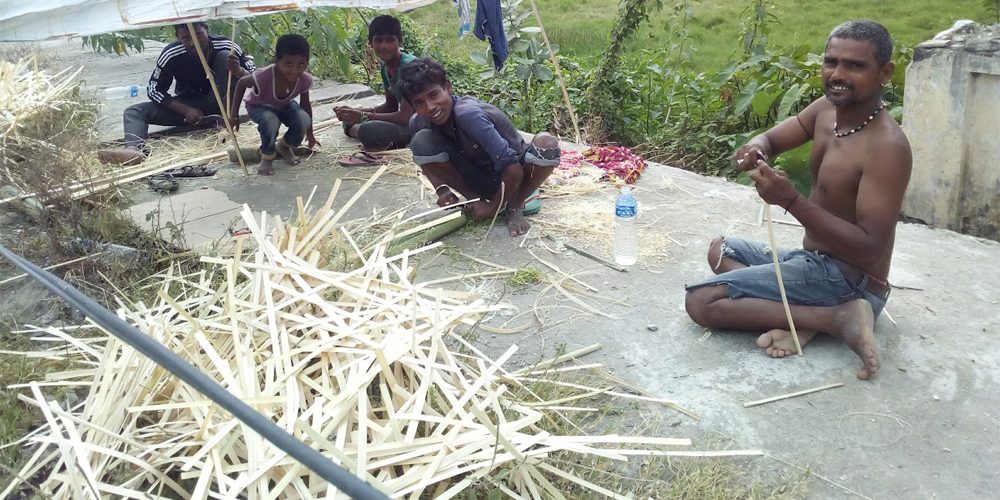- Monday, 2 March 2026
Traditional sanitation workers shift to making bamboo products
By Hari Prasad Koirala,Urlabari, Oct. 25: The Dom caste’s traditional occupation has, of late, come under threat due to the introduction of modern machines for cleaning of toilet, from cities to rural areas.
The Dom community’s ancestral profession in cleaning was often viewed as awkward and disrespectful. However, with the advancement of technology, their livelihood has been stripped away as modern tools like section pipes for toilet cleaning have become widely accessible. This has snatched away their traditional job.
“We stopped getting jobs,” expressed Dukhilal Marik from Kanepokhari-6, Morang, sharing his concern. Dukhilal, who has been supporting a family of five amidst hardship, recalls being busy all day just a decade ago. He mentioned that back then, he often had to turn down clients due to his packed schedule.
In the past, there was a tradition in villages of assigning work responsibilities by demarcating boundaries.
During that time, it was a part of Dukhilal’s routine to clean after consuming large amounts of alcohol.
Back then, homeowners never bargained because the Doms were the only option for cleaning toilets. They were compelled to pay whatever amount Dukhilal asked for, allowing him to earn a decent income.
However, times have changed. Now, homeowners negotiate prices, and the Doms are earning only half of what they used to. The days of earning a decent amount are now just a distant memory.
“People in the city have started using suction pipes to clean the toilets, and in the villages, they’re producing cooking gas from human waste by connecting toilets to biogas plants,” Dukhilal said with sadness. “It’s hard work, but even that is becoming scarce. We still have a long life ahead, but how can we survive?” he lamented.
The educational, social, and political awareness among the minority Dom caste is very low. Dukhilal Marik notes that some individuals who are aware have now changed their caste and identity. “Those who are wealthy and have access to resources no longer inquire about us,” he said.
Some youths from the Dom caste have secured postmortem jobs in government hospitals, but these positions are not permanent. They receive a small payment for the challenging work of conducting autopsies.
Recently, even in postmortem jobs, they have begun losing their positions to individuals from other castes. With diminishing work opportunities from villages to cities, the Dom community has now turned to earning a daily living by producing bamboo products.
Skilled at producing items from rattan, bamboo, and choya, they have decided to give up toilet-cleaning jobs.
As members of other communities have begun taking over these cleaning roles, they have shifted their focus to weaving traditional items like doka (hand-woven backside basket), pankha (fan), nangla (a flat round woven tray) and dalo (woven basket), among others and selling them in markets.
“Even though our traditional profession is in crisis, we must fill our stomachs. While we can survive on just one meal a day, we can’t let our children starve,” said Dukhilal.
A bundle of bamboo purchased for Rs. 150 is cut and crafted into choya, which is then skillfully turned into fans and dalas. The bamboo, originally worth Rs. 150, can be sold for up to Rs. 700. While they earn money through hard work, they lack the habit of saving.
When they have a good income, they tend to indulge in drinking alcohol from early morning to evening, especially during the Chhath festival when they earn well from selling bamboo products. However, once they have money, they often stop working until it runs out.
Due to the same habits, Amita Devi’s husband, Dasanu Marik, died vomiting blood about 20 years ago.
“This incident shocked everyone for a few years, but now everyone has forgotten about it; the habits of the local remain the same,” said Dukhilal, who is nearly 60 years old.
Neither the state nor the government has addressed the issues faced by the Dom caste, who continue to live in poverty, illiteracy, and ignorance.
Nor have non-governmental organisations addressed their issues. Even after the establishment of democracy and a republic in the country, the problems faced by the Dom caste persist. It is the state’s responsibility to resolve these issues, yet the state remains unaware.

















